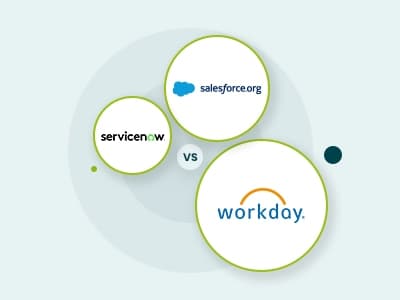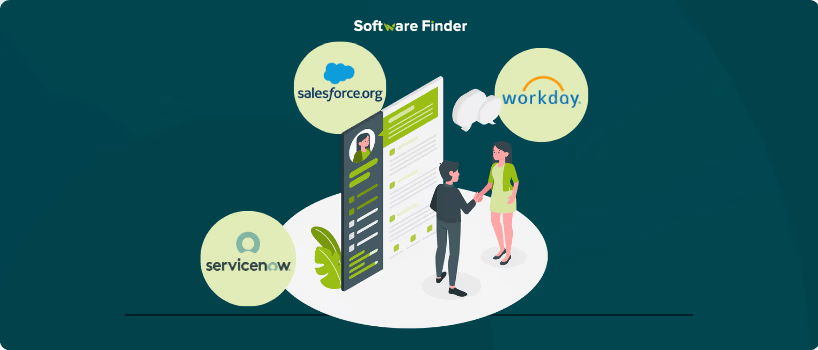
Selecting the right enterprise software is crucial for improving operational efficiency, employee engagement, and customer value delivery. Today, organizations are turning to platforms that can handle everything from internal workflows and HR processes to customer relationship management (CRM) and workforce planning—all in one place.
ServiceNow, Salesforce, and Workday each offer distinct capabilities, ranging from workflow automation and customer engagement to comprehensive HR and financial management.
This ServiceNow vs Salesforce vs Workday comparison breaks down their standout features and user reviews to help businesses invest in the right solution for their operational priorities
Feature | ServiceNow | Salesforce | Workday |
Ease Of Use | Interface can be complex sometimes | Can be complex sometimes | Intuitive interface |
Mobile App | Offers a mobile app for Android and iOS | Mobile app available for iOS and Android | IOS and Android mobile app available |
Integrations | Offers integrations with various third-party applications | Offers integrations with various third-party application categories, including marketing, sales, finance, productivity, and more | Offers integrations with various third-party application categories, including HR, finance, planning, and more |
Pricing | Pricing starts from $100/month | Pricing starts from $25/user/month | Customizable pricing plans |
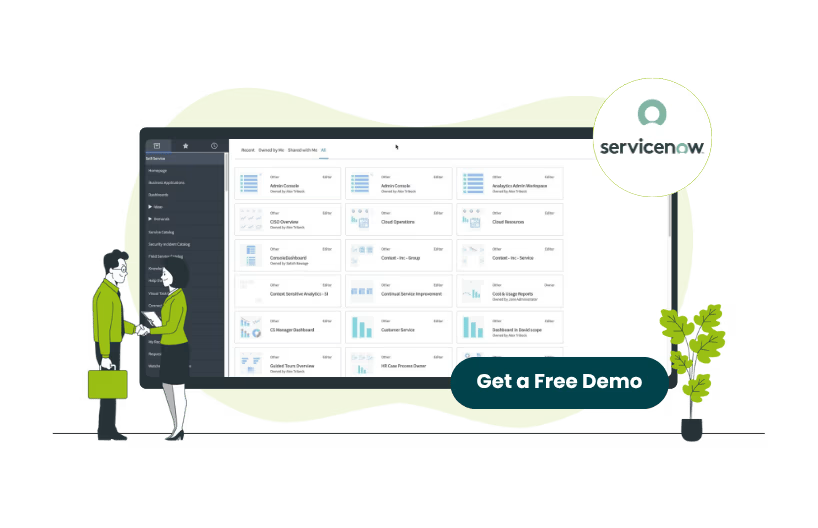
ServiceNow HR is an AI-powered platform built to automate and optimize enterprise workflows across departments. The platform’s core features include workflow automation, predictive analytics, customizable dashboards, and mobile support.
Designed to serve a broad spectrum of industries—including healthcare, finance, manufacturing, and the public sector—ServiceNow offers industry-specific solutions that tackle unique challenges, improve service delivery, and drive better business outcomes.
Standout Features
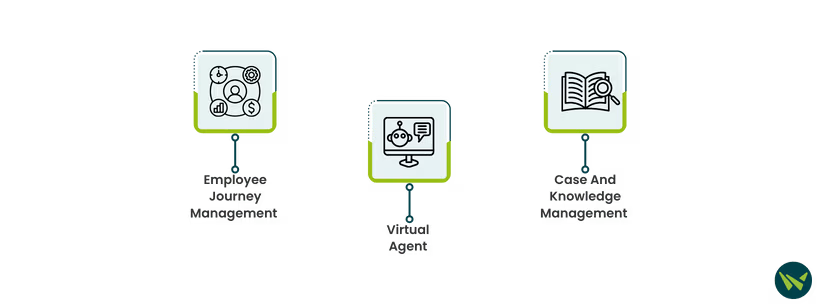
ServiceNow Pros And Cons
Users describe ServiceNow as a reliable platform that serves as a central hub for connecting data from various systems and driving business processes. One user, with over a decade of experience, praised its seamless third-party integration capabilities. Another emphasized the platform’s stability, noting that issues are rare.
A user highlighted:
ServiceNow is a hub platform intended to bring in data from other systems and act as a cog in the middle to drive processes. In my 11 years in this platform I’ve found it incredibly easy to integrate with 3rd party systems.
Source: Reddit
Another user highlighted that:
I love the platform in that it works very satisfyingly. I've never encountered an issue that did not have a very specific cause (unless it was some type of global performance issue).
Source: Reddit
One user pointed out that while ServiceNow offers flexibility in problem-solving, its cost structure, especially when used as a SaaS platform, can be complex. Compared to on-premise systems, expenses tied to storage, transactions, and custom tables may unexpectedly add up.
Furthermore, a user reported that:
Compared to on-premise systems (which you can do with SN but we're using it as SaaS), the costs associated with storage, transactions, and custom tables is a bit of a minefield. You can solve a problem in multiple ways (which is nice) but some methods might incur additional costs and it's not always obvious in the development process.
Source: Reddit
ServiceNow As Compared To Alternatives
ServiceNow is better suited for workflow automation rather than customer relationship management, where Salesforce shines. While Salesforce excels in sales and marketing engagement, ServiceNow’s strengths lie in orchestrating internal processes and managing IT services.
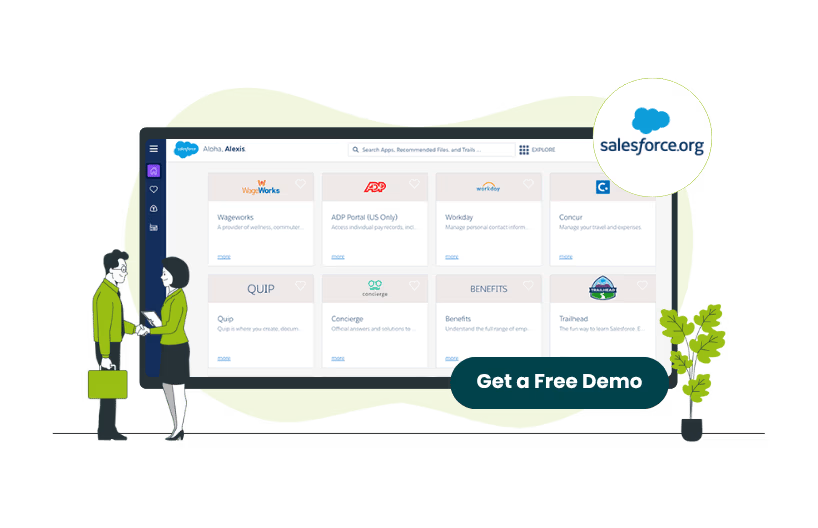
Salesforce Customer Success is a cloud-based CRM platform that enables businesses of all sizes to unify and manage operations across education, financial services, healthcare, manufacturing, and media. Its robust product suite—including Sales Cloud, Service Cloud, Marketing Cloud, and Commerce Cloud—helps streamline customer interactions.
Salesforce's modular architecture allows businesses to customize and scale their CRM solutions according to specific needs, making it a versatile tool for enhancing customer relationships and operational efficiency.
Standout Features
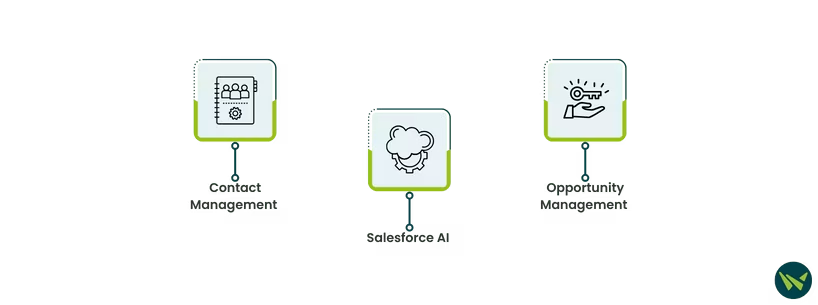
Salesforce Pros And Cons
Salesforce is praised for its strong support of declarative development, allowing users to customize and build within the CRM through intuitive tools. Its development environment is considered one of the best in enterprise software, with extensive capabilities that streamline customization without deep coding.
A user highlighted:
Salesforce has many advantages as of today. But at its core the one thing Salesforce did early on better than anyone since in my opinion and the reason why they have so much success is that the Salesforce platform supports and integrates declarative development better into the CRM than any other competitor by a long shot.
Source: Reddit
Another user said that:
Salesforce has the best point-and-click tooling. It also has the best development tooling for enterprise software. Salesforce has the most investment in expanding their product offerings relevant to CRM.
Source: Reddit
Salesforce is recognized as a highly versatile and powerful platform capable of supporting a wide range of business needs. However, it demands significant ongoing maintenance, dedicated personnel, and substantial financial investment.
Some users complained that:
Salesforce is an extremely powerful product with which you can do pretty much anything. But it's very high maintenance, requires full time folks and costs a lot of money. It's great for a large enough company willing to dedicate money and resources and fully integrate with other systems.
Source: Reddit
Salesforce As Compared To Alternatives
When compared to Workday, Salesforce is more customer-centric, excelling in sales and marketing tools, whereas Workday leads in employee experience, payroll, and workforce planning. Organizations prioritizing customer engagement typically favor Salesforce over Workday.
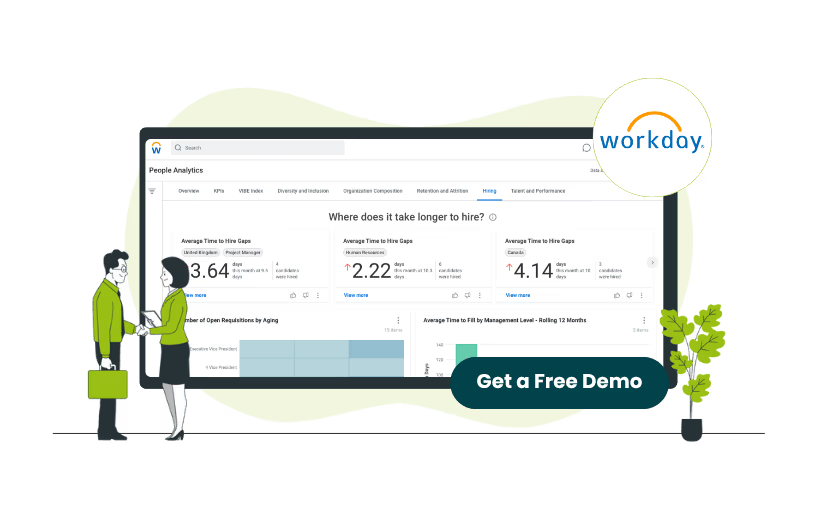
Workday Adaptive Planning is a cloud-based platform that integrates financial management and business planning into one AI-powered solution. Built for organizations of all sizes, it supports a wide range of HR functions. These include payroll, talent acquisition, and workforce planning, alongside financial operations like accounting, budgeting, and expense management.
The platform helps streamline operations and enable data-driven decision-making. Its intuitive interface and mobile-friendly design empower both employees and managers to use the system efficiently, boosting productivity and engagement.
Standout Features
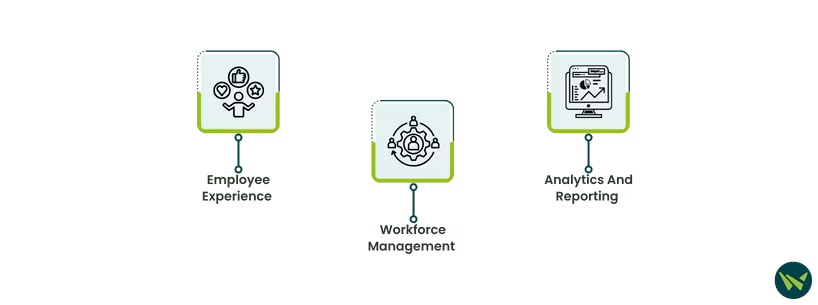
Workday Pros And Cons
Workday is valued for its comprehensive functionality and adaptability, especially in areas like benefits administration and complex policy management. Some users note its efficiency in recruitment workflows, enabling quick responses to job applications.
A user reported that:
It’s great! My last two companies use Workday and each place had their own HRIS team to configure and maintain it. The system can really do it all. In my case, I work in Benefits. We have a ton of different benefit plans and company policies we need to manage. Workday easily supports the administration & integrations with outside vendors.
Source: Reddit
Users also mentioned:
I just had an interview with a company that used workday for their application. I was contacted the very next day after I submitted it to schedule an interview. I have no idea how my application actually got seen by a person.
Source: Reddit
Workday is known for its high level of customization and process-oriented structure, but its complexity can pose challenges during implementation. Unlike platforms with robust in-house support teams, Workday often requires businesses to hire external consultants to handle setup and guide configuration.
A user reported that:
We implemented Workday and its very complex. It will likely require outsourcing a Workday consultant company to get you set up and guide you through how everything works. Workday does not really have like a customer service team like ADP or UltiPro. You buy the software and then everything is on you to create, implement, and maintain. So it's very customizable but also very process-oriented and can get complicated.
Source: Reddit
Workday As Compared To Alternatives
Workday delivers a more comprehensive solution for HR, finance, and workforce planning than ServiceNow, which is more aligned with operational workflows and service management. For organizations focused on internal business operations and employee-centric needs, Workday is generally the more suitable option.
In summary, ServiceNow is a centralized, automation-driven platform ideal for managing complex workflows. Salesforce is the leading choice for customer relationship management, offering powerful sales, marketing, and service tools. Workday suits medium to large enterprises looking to unify HR and finance. It excels in workforce planning, benefits management, and data-driven decision-making, focusing on holistic business planning.
Each of these platforms excels in different areas, and the best fit between ServiceNow vs Salesforce vs Workday depends on your organization’s specific priorities and operational requirements.
